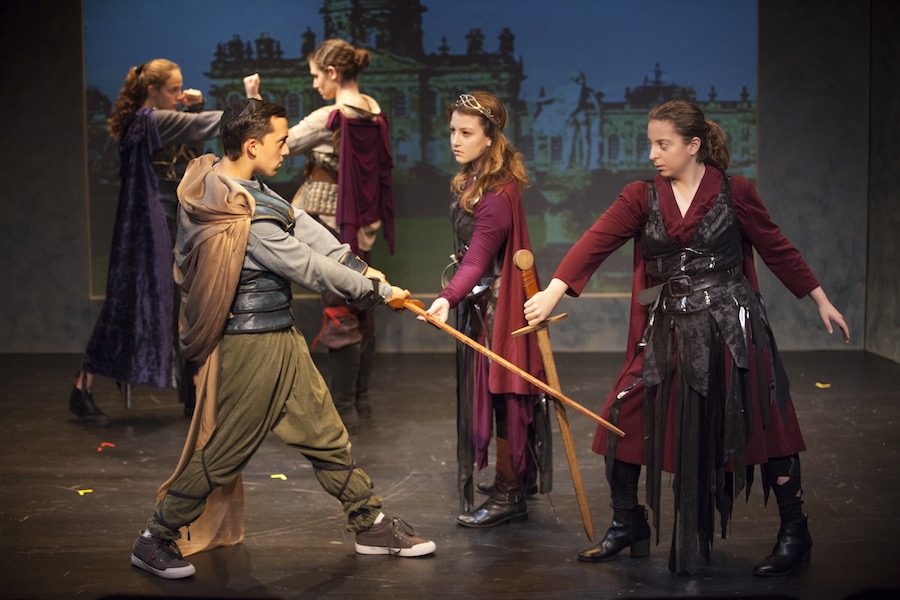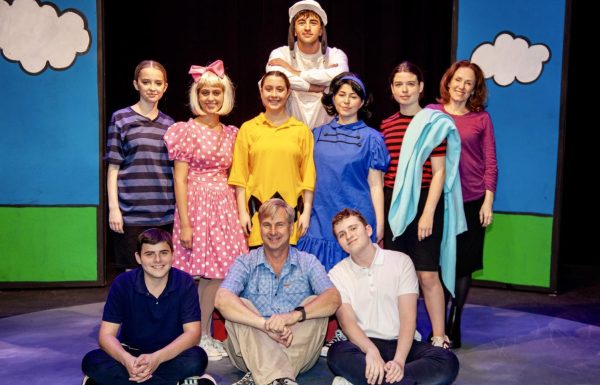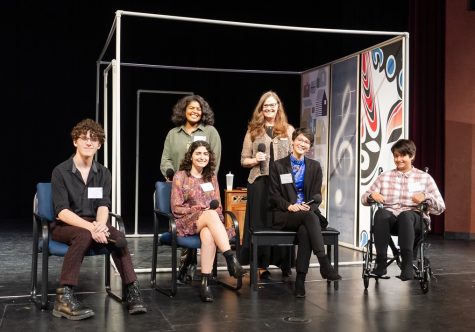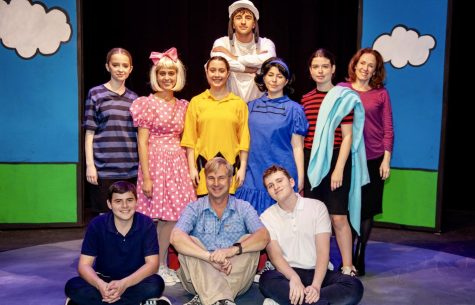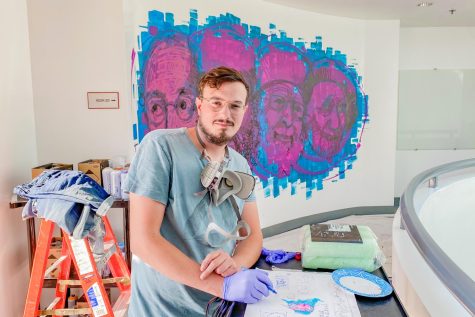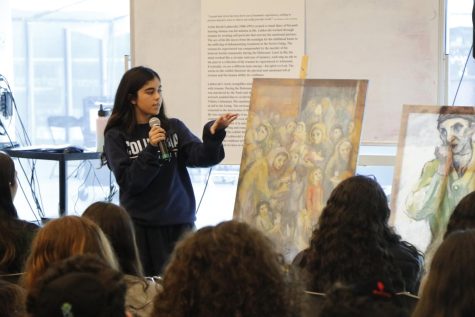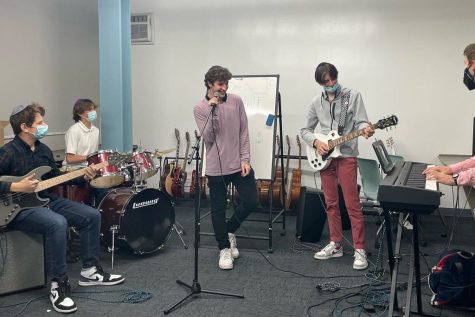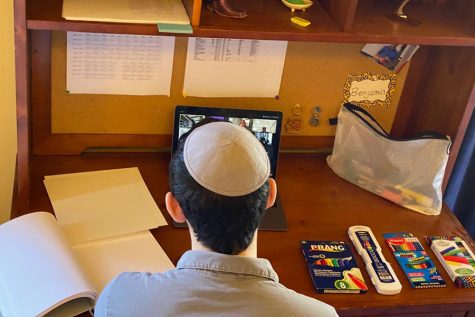Modern-day issues, captivating scenes in Drama’s ‘The 10 Plagues’
An adolescent frog recites a sonnet about wanting to sing to wild frogs, away from her pet shop tank. The idea of the exodus as a tale of escape from different kinds of “enslavement” – and the ingenuity, in this case, of a connection to Pharoah’s plague of the frogs — were seen throughout the appropriately-timed April run of The 10 Plagues, this year’s festival of one-acts presented by Shalhevet Drama.
Written by students last fall, the five plays and two short films were mentored by outside playwriting instructor Mickey Birnbaum, and performed and directed by students with the help of juniors Isabella Hoffman, stage manager, and Netanel Sadeghi, video and sound operator, along with Drama director Ms. Emily Chase and professional set designers.
Together they were not only enjoyable, but the many disparate elements, media and styles kept my attention. I was held rapt by the performances. The acting, staging, and plots were superb. Also, in a world where TV shows longer than 20 minutes are rare, the fast-paced and action-filled performance was perfect for a teenage attention span.
Particularly memorable was Jenny, written by Hannah Jannol and directed by Adam Ritz, with freshman Noa Silberstein in the title role. It told the very comedic tale of a teenaged frog named Jenny who wants to leave her cage and explore the swamp and the world of frogs so she can find an audience as a ribbeting musician.
Her adoptive “parents” — actually pet shop owners, played by sophomores Dylan Corn and Ariel Urman — worry about how she’ll survive without them, depicting teenagers’ changing relationships with their parents before they leave the nest. Though thoroughly comedic, Jenny also offered creative tie-in to the plague of frogs
And it also struck a serious note since the pet shop owners, who are a married couple, fight, and Jenny is what’s keeping them together. Noa stole the show with her comedic timing and poignant contention that a family cannot not only be tied together with a (symbolic) frog. The set was a large, leafy, “tank” — lovely and relevant to the seniors I was watching the play with, all preparing to leave Shalhevet for a bigger world.
The program opened with a playful short film, Fire and Ice, by sophomore Sabrina Jahan, about a sentient fire and ice and their union during the plague of hail, I was struck by its modern feel.
The first live play presented was “Four Little Monkeys,” written by sophomore Gabrielle Lasry and directed by junior Hannah Merritt. It started out with a bang, quite literally, when a seemingly jolly group of wealthy investors is interrupted by a flicker of lights, a bang and the sudden death of one of them, played by freshman Hannah Potorak.
This And Then There Were None-style play represented the plague of blood; the actual executioner, played by freshman Rebecca Cohen, has poisoned the others’ blood-red wine. It was a story about revenge with twists and turns as to who the villain was, and although the plot was sometimes confusing, the treacherous and cold-blooded nature of business sharks was clear and riveting. Senior Amin Lari played a vengeful tech mogul, while Daniel Medavoy played a man with big pockets and an even bigger personality.
Secrets, shown next, was written by sophomores Amy Cohen and Yishai Thau and directed by senior Shana Lunzer. It presented a relationship struggling under the burden of a rift in love. The stage direction was dynamic in an otherwise simple scene, with Neima Fax as the wife and Adam Ritz as the husband cleaning up a trail of stuff he had left strewn over their living room, while she explains his faults in a huff. Both actors credibly expressed their characters’ complex emotions.
Ultimately this tale of struggle between spouses could have been improved by a more convincing romantic connection, which was obviously not allowed because of Shalhevet’s rule against males and females touching. Although this gripe is small, it was very obvious when the actors had to stand far away from each other when overjoyed by the wife’s reveal that she is pregnant. I would hope for future plays exploring close female-male relationships that less obvious work-arounds to this rule could be found. I was also not too sure what the play’s connection to the 10 plague’s was.
Another kind of relationship was explored in The Names, written by Amin Lari and directed by Shana Lunzer. This one-act took a hard look at the criminal justice system — and those who oppose it — through the relationship between a jailed cult-leading vigilante and a detective trying to uncover where his supporters were hiding. Senior Amin Lari played the cult leader, Harry, while junior Donna Grunfeld played the detective.
The script used the audience as supposed students watching the detective demonstrate how a tough suspect should be interviewed — and then, in a plot turn, it turned out these “students” were Harry’s supporters trying to break him free. Amin’s menacing yet charming character offered comedic relief and I was honestly conflicted about who was really the moral guardian — Harry or the detective. A side character, a guard played by Albert Gordon, was convincingly opaque in his double-crossing role.
When the lights go out in order for Harry to escape his handcuffs, Harry commands the detective not to move — reminding of us of the Midrash that during the plague of darkness Egyptians were afraid to move, out of fear that God would strike them down. I thought this tie-in was genius, because as it would be natural for a cult leader to narcissistically compare of himself to God.
“The Locust Bug” — the program’s second short film, by Talia Abel and Jordana Glouberman — was a perfect comedic break from these very intense dramas. Starring Hannah Poltorak as Evie, the film explores smartphone addiction when a technology virus — called Locust Bug — shuts down all devices. As the characters slowly put down their phones and change from text-speak into full sentences, comedic scenes of children passing around concrete things like balls with complete wonder and incompetence created a feeling of simpleness and humor.
Toward the end of the film, the Locust bug is destroyed and almost everyone goes back onto his or her own technology. But Evie likes the real world without her phone and meets a man who feels the same, way. “What’s your name?” she asks. It’s Adam – perhaps implying that humanity needs to start over. This Biblically themed narrative, connected to the plague of locusts through the virus’s name, tackled a very modern topic and was cute without being preachy – it seemed like something I would see on my own social media accounts.
Primal Instincts, written by Donna Grunfeld and directed by Amin Lari, was the most dramatic and emotional play of the set. It was about two queens, Nayea and Scarlex, played by Shana Lunzer and Hannah Merritt respectively, who disagree about how to rule their newly aligned kingdoms. Choreographed fighting scenes were both professional and intense. Though their philosophies differ, both of these empowered women displayed complex yet strong natures, rare in writing and in depictions of women. Nayea thinks it is best to strike first, while Scarlex believes that waiting for war to break out is a better way to maintain peace.
Their opposing worldviews come to head in a twist where Nayea’s daughter is accidently killed in an attempted assassination of Scarlex’ daughter. Nayea’s pain was excruciatingly real and well-acted by Shana Lunzer, whose icy character nevertheless wants what is best for those she loves and will protect them with her life. Not only was I impressed by the modern take on conflict in royalty, but the acting and costumes of side characters — a slave played by Anna Weiss and a daughter played by Aviva Katz — bolstered a fantastical and unique world that still seemed believable.
The relation of this one-act to the 10 Plagues was supposed to be to the plague of wild animals — using Nayea’s argument that humans are savage animals at heart. But I thought the connection of Nayea’s dead first-born would have sent a cleaner message.
Overall, this year’s spring one-acts were both captivating and innovative.
Transitions between the plays were seamless; a digital backdrop allowed each one-act to seem transported to its proper setting without a lot of time between plays that would take an audience out of the experience. The clean set designs, music and choreography were all improvements that gave the performance professional appeal.
From the technological incorporations to modern themes like flying the coop, to the flaws in our justice system and the struggles that all leaders face no matter their gender, they were meaningful, relevant and appealing.
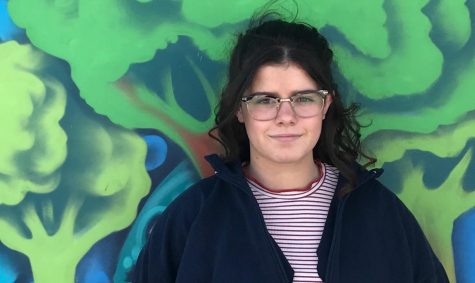
Aidel Townsley has written for Boiling Point since she transferred to Shalhevet three years ago. Most proud of her advice pieces for the Boiling Point, she is now Opinion editor. Her other interests include music, psychology and biology.

